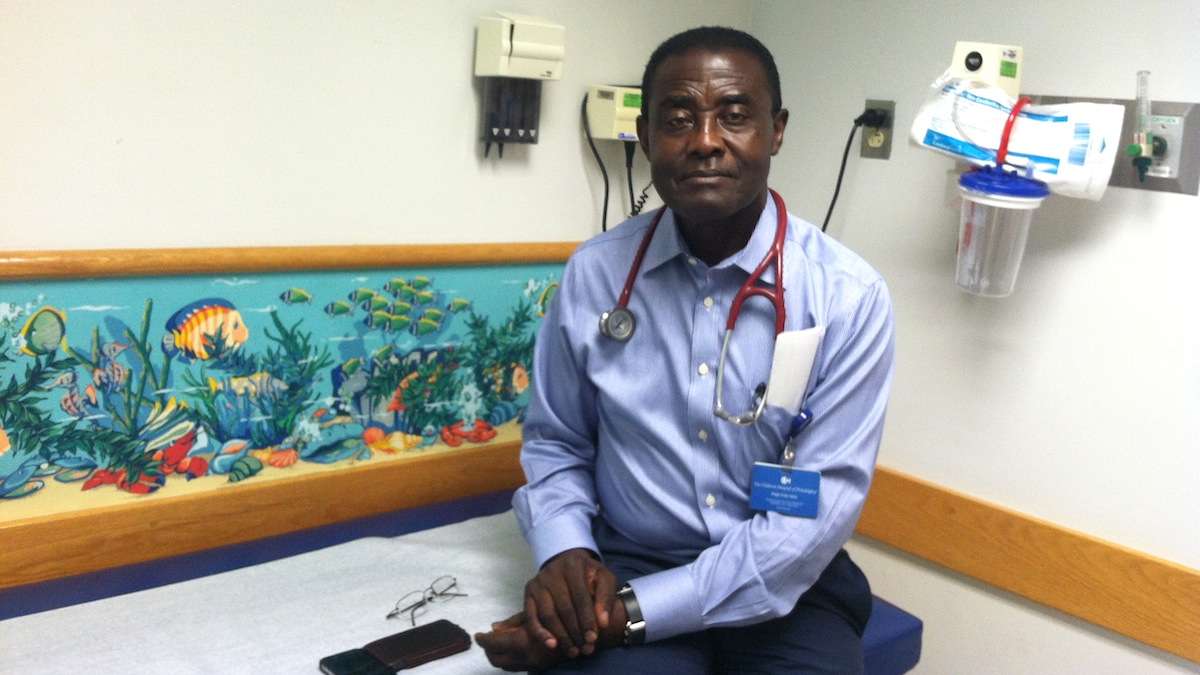Too many people with sickle cell disease face ignorance, lack of support from medical community

Doctor Kwaku Ohene-Frempong is an attending hematologist at Children's Hospital of Philadelphia and Director Emeritus, Comprehensive Sickle Cell Center. He has treated pediatric sickle cell disease for 40 years. (Laura Benshoff/WHYY)
It was difficult to listen to the sickle cell disease segment. Both my siblings have sickle cell [disease], and I’ve spent my life watching them suffer through a painful illness, and every day I have to cope with the reality that we may not all grow old together.
September is Sickle Cell Awareness Month. This letter is the first in a series of three commentaries about sickle cell disease (SCD).
In the United States, 90,000 to 100,000 people have SCD. Additionally, more than 2 million people are carriers of the sickle cell gene but exhibit no symptoms, which allows them to pass the disease on to the next generation. Even though it has been known and studied for over 100 years, there is no cure and it lags behind similar diseases in both research funding and media attention.
—
It was difficult to listen to the sickle cell disease segment “Sickle cell disease still persists 100 years after discovery” [The Pulse, Aug. 15, 2014]. Both my siblings have sickle cell [disease], and I’ve spent my life watching them suffer through a painful illness, and every day I have to cope with the reality that we may not all grow old together.
While I’ve only been diagnosed with the trait, I have a long personal relationship with sickle cell because of my siblings, and I am well aware of “pain crisis” and know people who have succumbed to the disease. Sometimes I feel helpless. Seeing my sister (who is the most driven person I know) bedridden because of a genetic flaw, and knowing my brother has to “cocktail” pain and nausea medications, is beyond frustrating. It makes me angry really — we’ve known about this disease for how long, and the only thing we can do is take pain meds and “wait it out”? It seems like the disease was discovered, written about, and shelved.
Almost no thought is given to people like my siblings who live with this, day in and day out, and are sometimes forced to put their lives on hold because the pain in the legs, arms and chest are debilitating. Don’t they matter as much as those with muscular dystrophy or tay-sachs? Can people not sympathize with the pain my parents feel because they can’t help their children?
So many of the comments from those interviewed resonated with me. It hurts to hear that so many people who have sickle cell face ignorance, disbelief and a lack of support from the medical community as well as friends and family. The sad reality is so many people just don’t know. They don’t get what it means to have sickle cell and be told “It can’t be that bad,” “Have you tried this home remedy?” or “Isn’t there some medication you can take” The vast majority of people who have no direct interaction with the illness have not taken any time to become familiar with the disease let alone support those afflicted.
It’s not like breast cancer — not everyone wants to know and support and fight for research dollars — maybe because it generally doesn’t affect people outside of the African diaspora. I believe this is the primary reason sickle-cell is the “forgotten disease.”
What I really appreciate about the segment is that people acknowledged that the biggest hurdle to getting the support this community needs is awareness. We need to make a wider swathe of people care about this disease and identify with those who are suffering or dying because of it.
To support the fight against Sickle Cell I’ve participated in walks and other fundraising events in New York, Philadelphia, and Washington, D.C. I’ve also donated to foundations that specifically support sickle cell patients and research efforts in the U.S. and abroad. I don’t do enough. The segment reminded me that I have to do more, like donate blood and pressure my doctors and political representatives to focus a spotlight on the disease.
While it was painful to hear, I’m thankful your company recognizes the need for this type of coverage. The segment begins to put a face to a disease that goes hidden from most. I hope this is the first of many and I look forward to further coverage.
Martine M. Saint-VilBrooklyn, N.Y.
WHYY is your source for fact-based, in-depth journalism and information. As a nonprofit organization, we rely on financial support from readers like you. Please give today.

